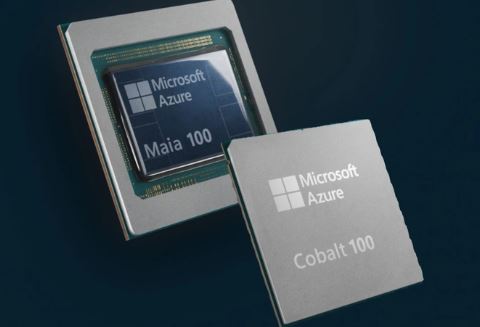
Intel Corp. has scored a significant victory in its efforts to revitalize its custom chip business, with tech giant Microsoft Corp. joining forces. This partnership signals a crucial win for Intel’s ongoing turnaround initiative led by CEO Pat Gelsinger.
Strategic Partnership Unveiled
Microsoft has revealed plans to utilize Intel’s 18A manufacturing technology for an upcoming chip designed in-house. While specifics about the product remain undisclosed, Microsoft has recently outlined intentions for two proprietary chips: a computer processor and an artificial intelligence accelerator.
Intel’s Foray into the Foundry Market
This collaboration highlights Intel’s ambitions to establish itself as a formidable competitor in the foundry market, where companies manufacture custom chips for various clients. Historically, Intel held a dominant position in chipmaking but is now striving to catch up with industry leaders like Taiwan Semiconductor Manufacturing Co. (TSMC).
Want to know if you’re earning what you deserve? Find out with LawCrossing’s salary surveys.
Meeting the Demands of Data Centers and AI
For Microsoft, securing a reliable semiconductor supply is critical, particularly for powering its expanding data center operations amid the rising demand for AI capabilities. Designing its own chips allows Microsoft to tailor products precisely to its requirements, enhancing performance and efficiency.
Confidence Booster for Investors
The agreement with Microsoft provides a significant boost to Intel’s turnaround efforts, reassuring investors about Gelsinger’s strategic vision. Intel aims to expand its manufacturing capabilities to meet heightened demand, albeit at a substantial cost. The support from Microsoft underscores the potential success of this endeavor.
Government Support and Future Prospects
Intel is actively seeking government support, including subsidies from the US and European authorities, to offset the expenses associated with expanding its chip manufacturing operations. Microsoft’s partnership could bolster Intel’s case for such support, especially amid talks with the Biden administration for financial assistance under the Chips and Science Act.
Implications for the Semiconductor Industry
The collaboration comes at a time when the semiconductor industry is grappling with supply shortages, particularly for advanced silicon. With major players like Nvidia struggling to meet demand for AI-centric chips, Intel’s move to secure a prominent customer underscores its commitment to reclaiming lost market share.
Intel Strengthening Partnerships for Future Growth
In addition to its collaboration with Microsoft, Intel has further solidified its position in the semiconductor market through an expanded partnership with Cadence, an electronic design automation company. This multi-year agreement aims to enhance Intel’s Foundry Services (IFS) offerings, particularly in advanced silicon technologies and 3D-IC packaging capabilities.
Enhanced Collaboration with Cadence
Intel and Cadence will collaborate to design customized Intellectual Property (IP) and optimized design flows for Intel’s advanced RibbonFET processes on Intel 18A and beyond. This collaboration is expected to accelerate project schedules for system-on-chip designs, catering to demanding applications in AI, high-performance computing, and premium mobile computing.
Advancing Intel’s IDM 2.0 Strategy
The collaboration with Cadence aligns with Intel’s Integrated Device Manufacturing (IDM) 2.0 strategy, which aims to transform its foundry business into a top-tier player. By offering a comprehensive portfolio of design tools and interface IP, Intel seeks to enhance its competitiveness and address the evolving needs of its customers.
Strengthening Competitiveness in the Foundry Space
The partnership with Cadence reinforces Intel’s commitment to innovation and customer satisfaction in the highly competitive foundry market. By leveraging Cadence’s expertise in electronic design automation, Intel aims to deliver best-in-class solutions that meet the performance and reliability requirements of its customers.
Outlook and Investment Perspective
Intel’s stock has shown resilience, gaining 70.8% over the past year despite industry challenges. With strategic partnerships like Microsoft and Cadence, Intel is poised to capitalize on emerging market trends and strengthen its position as a leading semiconductor manufacturer. Investors may find potential opportunities in Intel’s growth trajectory, supported by its commitment to technological innovation and strategic collaborations.
Don’t be a silent ninja! Let us know your thoughts in the comment section below.
